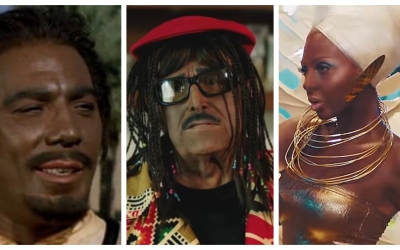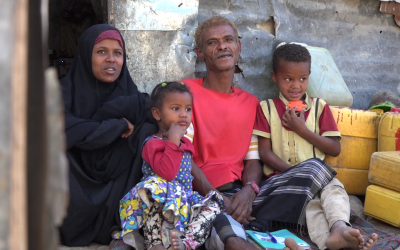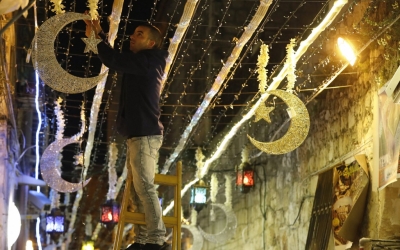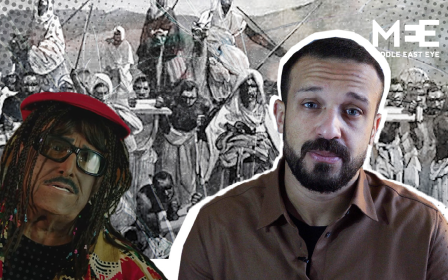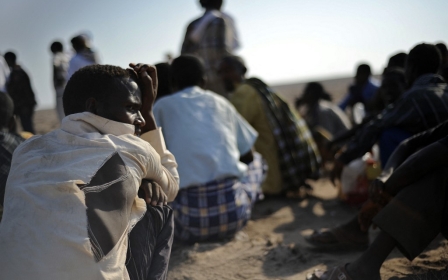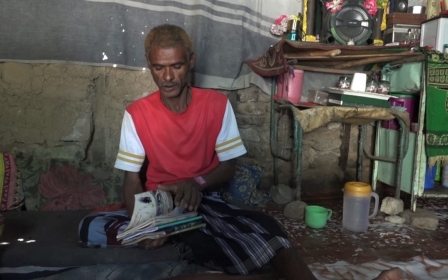Yemen Ramadan show sparks outcry over use of blackface
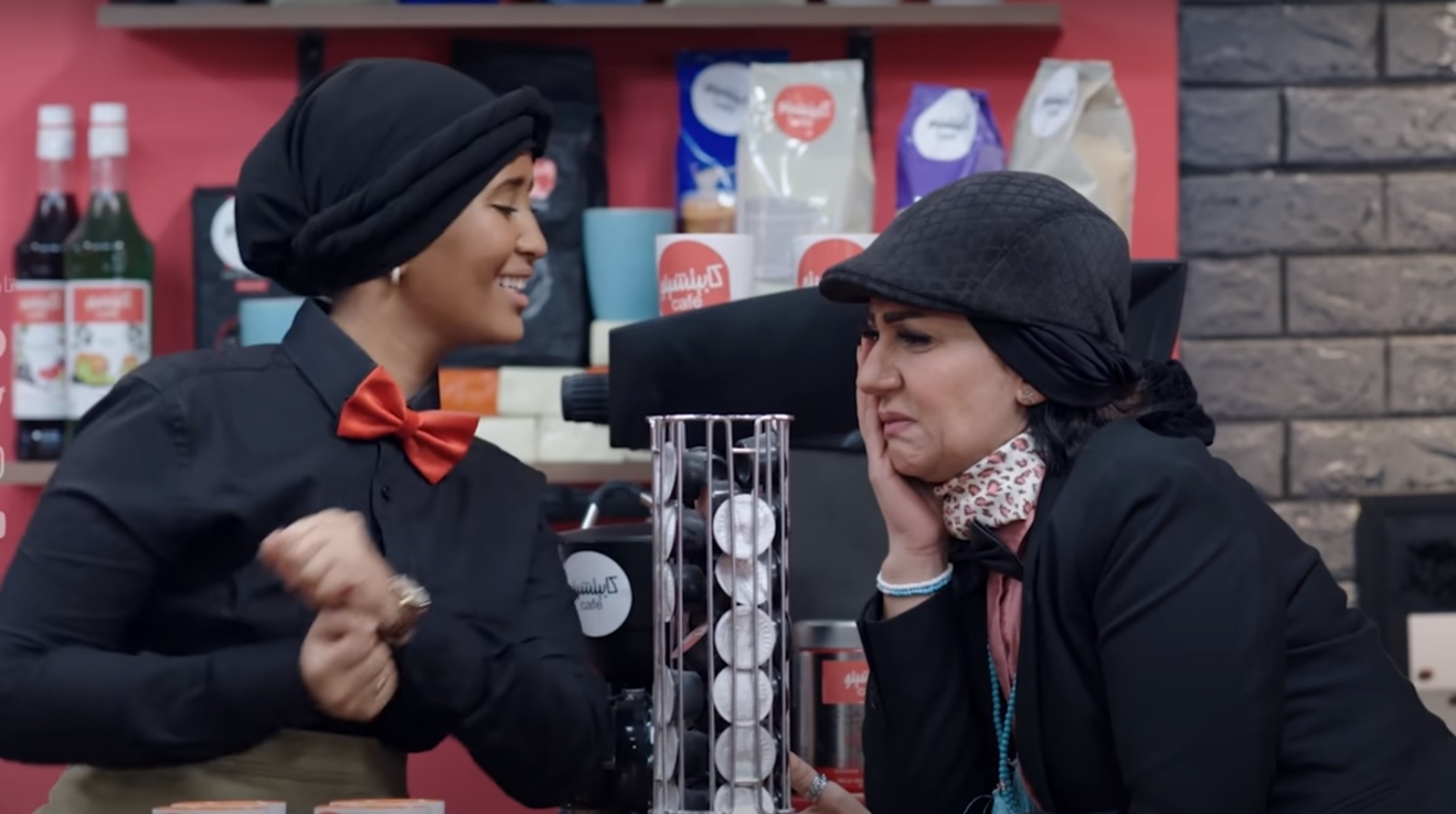
Ramadan is the season of sitcoms and TV series around the Middle East, but particularly in Yemen, where few channels show fictional shows outside of the Muslim holy month of fasting.
After breaking their fast at sunset, many Yemenis like to tune in and watch TV with their families.
Most TV channels in Yemen show series that project the political views of their owners and operators, six years into the Saudi-led offensive in the country against Houthi rebels.
But, while the politicisation of Ramadan shows isn't unusual in Yemen, one new series, Cappuccino, has caused a significant stir by featuring two actors in blackface.
Blackface is the act of darkening one's skin tone in what has been denounced as a racist caricature of Black people and appropriation of Black cultures. It has a long history both in the Middle East and beyond.
Cappuccino, which is broadcast on Yemen Shabab TV, based in Turkey, depicts two Black characters working as servants in a coffee shop. But they are played by Yemeni actors in blackface speaking purposefully broken Arabic to mimic African refugees in Yemen.
A number of scenes in Cappuccino have been criticised, including one in which the actress in blackface kisses a lighter-skinned Yemeni woman on the cheek and the latter expresses visible disgust.
In another scene, the same actress in blackface introduces herself as the "manager of the toilets".
The show has caused outrage, with some calling for Yemen Shabab TV to cancel Cappuccino altogether. The famous Yemeni cartoonist Rashad Al-Samie has also stepped into the fray.
Anti-Black racism
For many Yemenis, including some with African ancestry, the show has recycled tired racist tropes about Black people in the country.
The Akhdam community, who are distinguished from the wider Yemeni population by having darker skin, are said to have descended from Ethiopian soldiers who settled in the country during the pre-Islamic Aksumite invasions. As they do not have a confirmed tribal origin, they have often been treated as outsiders by many in Yemen, and are forced into menial careers, often as shoe-repairers or street sweepers.
Meanwhile, thousands of people from across East Africa have used smugglers to cross the Red Sea in recent years, hoping to enter Saudi Arabia. Yemen is often the only viable route for them to get into Saudi Arabia, with many also using the war-stricken country as a transit point to save up money before moving on into the oil-rich kingdom. When the Covid-19 pandemic first struck, Saudi Arabia closed its borders, leaving thousands stranded in Yemen.
'[This] TV channel is sending a bad message that Black people only work cleaning toilets and serving light-skinned people'
-Yasin Abdullah, resident of Taiz
"I'm a Black man and my grandmother is an Ethiopian, but I worked in oil companies and now I have my own project and I serve my country better than others who destroy it," Yasin Abdullah, a Yemeni from the southwestern city of Taiz, told Middle East Eye.
"Yemen Shabab TV channel is sending a bad message that Black people, especially Ethiopians, only work by cleaning toilets and serving light-skinned people."
Nasser al-Qubati, a resident of Hodeidah province, pointed out that racism and discrimination are prevalent in Yemeni shows whether based on skin colour, ethnicity, or regional stereotypes.
"We watched more than one Yemeni series portraying Tehami people [from Hodeidah] as uneducated and their women as not good, which isn't true," he told MEE. "We've spoken out about the racism against us more than once, but no one supervises the TV series and sitcoms produced outside Yemen."
Abdullah worries that, by propagating negative perceptions of the Ethiopian and Somali refugees in Yemen ,Cappuccino could reinforce prejudice against these vulnerable communities.
"It is true that many Ethiopian and Somali refugees work cleaning restaurants and coffee shops, but that isn't shameful," he said. "Rather it is honourable. They don't steal or do anything illegal, but work to put food on the table.
"The real crime is that this TV channel features light-skinned people treating refugees in a disgusting way," he added.
Qubati said that he doesn't watch Yemeni TV series because they use racism in the name of comedy.
"We don't want comedies that insult communities based on their skin colour or the region they are from," he said. "We call for an end to such TV series."
The negative reaction to Cappuccino has given Abdullah hope. "The campaign against this sitcom and the channel showing it has made me feel happy that this channel doesn't represent Yemenis," he said.
'Racism isn't comedy'
Yemenis who spoke to MEE seemed to widely believe that there was little or no supervision of the content broadcast by TV channels in the country, especially since most are based outside of Yemen.
For example, Cappuccino was produced by a company in Jordan. MEE couldn't reach the team behind the series for comment.
Zakaria Dahman, a Yemeni TV producer, told MEE that the anti-Black and anti-refugee racism in Cappuccino was down to the writing and producing staff.
'The sitcoms are creating hatred in the hearts of Yemenis'
- Yasin Abdullah, resident of Taiz
"Cappuccino encourages racism through the words and the behaviour of the actors and actresses, and this is a big mistake by the writer and the producer," he said.
"We are in the 21st century and we have to reject such bad behaviour. But unfortunately, there are some people who still represent it in sitcoms.
"Racism isn't comedy. This sitcom is trying to make people laugh by using the wrong behaviour of the wrong actors."
Dahman noted that Yemeni channels usually start to produce their Ramadan series only a few months or weeks beforehand, leaving little time to produce high-quality work. He also said that some TV channel owners impose their ideas for series, even if they do not have experience with scriptwriting.
"All these factors lead to weak outcomes with mistakes," he said.
Regarding Cappuccino, Dahman said: "There is no clear message in this sitcom, and the content is very weak. I think the reason for that is that it was produced under pressure before Ramadan."
Dahman also argued that, instead of painting the faces of Yemeni actors, Yemen Shabab TV should have hired Ethiopian actors to play the roles of refugees in Cappuccino, provided that the show had a positive message for viewers.
Politicised television
The Cappuccino debacle has led some to question whether Yemeni TV series are worth watching at all.
"I used to enjoy Yemeni sitcoms, but recently I stopped watching them altogether, as they are politicised and target people based on their region and colour," Abdullah said. "These sitcoms are creating hatred in the hearts of Yemenis, while I'm educating my children to love each other and live peacefully in society."
Yemeni sociology teacher Mamoon Mohammed believes that Yemeni TV series encourage division instead of unity between communities, in large part due to the political affiliations of each channel.
"Most Yemeni TV series are racist, they criticise Yemenis based on their skin colour, region and political affiliation, and this year there is racism against refugees from the Horn of Africa," he told MEE.
"This isn't the type of TV series that Yemenis need. We need shows that call for peace, unite the community, and make Yemenis accept each other and accept refugees who fled their countries," Mohammed added.
"If people in the Horn of Africa are watching the racist sitcoms against refugees in Yemen, they will have a bad attitude towards Yemeni refugees in their countries, and this isn't what we want at all."
While Yemeni actors may say they are working under pressure and that it can be hard to find the funding necessary to make high-quality TV series at short notice, Mohammed believes "that this isn't a convincing reason to be racist against anyone".
"We call for a humane relationship among Yemenis, and with other people either inside or outside the country."
This article is available in French on Middle East Eye French edition.
Middle East Eye delivers independent and unrivalled coverage and analysis of the Middle East, North Africa and beyond. To learn more about republishing this content and the associated fees, please fill out this form. More about MEE can be found here.


